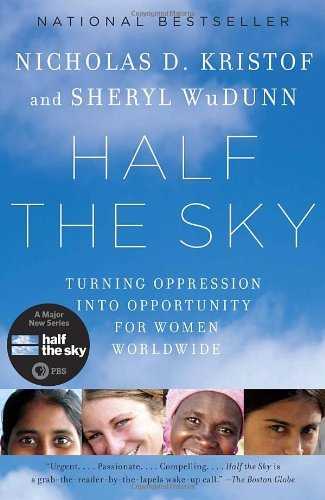It hit me at 17 -- even though I had always viewed my actions as opportunities to dismantle stereotypes, and open eyes and doors for women. But at 17, I realized that we couldn't fight individually: a systematic push was needed.
Academic year 2000-2001: my final, hardest year in a Montreal, private girls' school. Endless work, personal struggles, friendships' ebb and flow... Yet, thanks to English class, it was the best: English class exposed my soul. It was there that I realized education was the route to understanding myself. Personal issues were delved into via creative writing. In written reflections, I examined my psyche through the female protagonist's in Margaret Atwood's Alias Grace. My most memorable moment? Reading Charlotte Perkins-Gilman's The Yellow Wallpaper. There was no lecture: the story was allowed to speak for itself. At that moment, the course -- punctuated by a portfolio revealing the parallel metamorphosis of my writing and personality -- came full circle. I interpreted a (feminist) text independently -- and I got it. Without knowing its name, I understood feminist pedagogy.
My epiphany occurred when I stepped back, examining the year through my inherent feminist lens. It was not simply the reading and writing that rendered it exceptional; it was the chosen content and assignments that introduced us to our ripened teenage selves -- we understood ourselves as women. Our personal lives were given validity at a time when our self-concepts were fragile, simply because we felt we could so easily get lost -- in school, in society... I realized the power of education. That's when it hit me: why don't girls' schools have a women's studies course? In fact, I wondered why it wasn't mandatory in all single-sex schools -- for both sexes. Why segregate the sexes without offering a course wherein gender and sexuality are explored?
So I became a teacher, my goal to return to my school and create that course. Job acquired, I began my MEd in Educational Psychology after (surviving!) my first year, researching the need for feminist pedagogy in girls' schools as a means of preventing eating disorders. The link made sense; hell, it's necessary.
But incorporating a course into a mandated curriculum proved difficult. Enter synchronicity: after presenting at a round-table, I was approached by an organization named ÉquiLibre, and was asked to lead the incorporation of its comprehensive eating disorder prevention curriculum at my school! I dove in, adapting the program to our environment via activities that foster self-esteem and healthy lifestyles. While this was (and still is) a powerful experience, the message was missing from the classroom. How would girls understand how far women have come, and modern manifestations of patriarchy, without examining women's issues and the women's movement, in detail? Some teachers address these issues in their courses -- and, yes, a comprehensive approach is crucial. But not all do -- not all can, simply due to time constraints. I believe a true understanding and appreciation cannot be fostered without a specific course.
So when the opportunity to teach senior Ethics presented itself two years ago, I used it to make my feminist dream come true. One period per week is not ideal; still, a great deal of critical thinking is done. We study various religions, emphasizing women's roles. Through articles, documentaries like the phenomenal MissRepresentation, and TedTalks including Dr. Caroline Heldman's thought-provoking The Sexy Lie (which can be viewed here) we examine women's issues and the Movement. The most profound experience? Reading Nicholas D. Kristof's and Sheryl WuDunn's Half the Sky. I see young women's eyes widen (and water) upon realizing that the structures that violently oppress women across oceans, also keep them feeling small, voiceless, and decorative. I see the shock when they understand what dehumanization is -- how implicit it is in our society.
Yet the greatest reward is witnessing the point of internalization: when they bring the discussions to the dinner table, challenge friends (including male friends) outside of school, interpret media -- and understand themselves. One student even found the confidence to discuss the responsibility that boys bear for their behaviour at dances -- rather than putting the onus on girls' attire -- with a teacher at another school! And in a remarkable act of selflessness, the entire graduating grade made a donation to Edna Adan's maternity hospital in Somaliland (whom they read about in Half the Sky), as a graduation present.

Image source
This is how I spent prom that year: students relaying discussions had with dates about sexism; parents thanking me for opening the entire family's eyes to women's issues; students protesting when the DJ played Blurred Lines. I still get thank you emails and visits, wherein plans to take women's studies courses are revealed. Such is a feminist pedagogue's dream.
My students breathed new life into my 13 year-old dream. In researching like-minded educators, I came across some wonderful examples of those who fight for and have incorporated gender studies into high school curricula: The Miss G Project in Ontario, and Ileana Jimenez in New York. However, I did not find evidence of single-sex schools making such a course mandatory: convincing them remains my mission. All schools require gender studies, but it is my firm belief that single-sex schools bear a particular responsibility.
I continue with the program, and reach out to higher powers via emails and phone calls. Change will happen. Results like these tug at the little girl who believed that she acted on behalf of women.
Making the personal political has to start somewhere. It starts with making the personal educational.
This post originally appeared on New York-based, Soapbox Inc.'s blog on September 25th, 2014.
Maria can be reached via e-mail at discalam@villamaria.qc.ca.